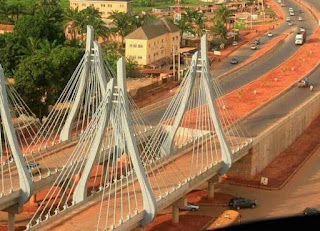PROPERTY DEVELOPMENT IN NIGERIA
INTRODUCTION
Real estate development, or property development, is a business process, encompassing activities that range from the renovation and re-lease of existing buildings to the purchase of raw land and the sale of developed land or parcels to others.
Real estate developers are the people and companies who coordinate all of these activities, converting ideas from paper to real property.[1] Real estate development is different from construction or house building, although many developers also manage the construction process or engage in house building.
Developers buy land, finance real estate deals, build or have builders build projects, create, imagine, control, and orchestrate the process of development from the beginning to end.[2] Developers usually take the greatest risk in the creation or renovation of real estate and receive the greatest rewards. Typically, developers purchase a tract of land, determine the marketing of the property, develop the building program and design, obtain the necessary public approval and financing, build the structures, and rent out, manage, and ultimately sell.
What are the three stages of land development?
The Land Development process will consist of three stages: Feasibility, Entitlements, and Land Development Construction.
1. FEASIBILITY ANALYSIS
During this stage, developers are running feasibility analyses. This is where you will determine if it makes sense to develop. Can you develop/build and turn a profit? That’s the golden question! This is the phase where you need to research the local area, the market, growth, zoning restrictions, the timing of the market, nearby amenities, good schools, demand for your particular housing product, etc.
The Offer!
So if everything is checking out, the developer will put together what some may refer to as the “quick and dirty” or “back of the napkin” analysis to come up with an offer. And most likely that offer will be based upon their best assumptions and experience because you must understand something, it is IMPOSSIBLE to vet out every unknown cost associated with the site promptly before making an offer on it!
Now, I’m not saying that you shouldn’t do your due diligence. You absolutely should! But it’s all about the timing! You must understand the timing of your approach. Too much due diligence before you submit an offer could cause you to lose out to someone else who ties up the property before you do. And all the while you’ve wasted a ton of your resources along the way (time, money, energy, etc).
Get Rough Estimates for Now!
This is why home builders and developers can analyze property so fast and make an offer pretty quickly. BECAUSE THEY HAVE THE EXPERIENCE! They know how much the fees will cost, how much it costs to develop the land, and how much it costs to build their homes. And they also know how much similar houses are selling for in that particular area! That’s your “back of the napkin” offer!
But it’s not to say that YOU cannot get these costs and make an offer. Rather, you may just have to spend time calling and talking with consultants, contractors, builders, etc. to find out some rough estimates. (TIP: It’s easier to try and get a “per lot” cost or a “lineal footage frontage” cost depending on how your specific area looks at things. Because if you can get numbers that you can easily scale over the number of potential units, it makes this process a whole lot easier.)
As mentioned previously, every site is unique, which means the costs are going to vary from project to project. So the “back of the napkin” offer as stated above is not 100% accurate. Your real numbers will start coming together during the next stage: “ENTITLEMENTS”.
2. ENTITLEMENTS
So now that the seller has accepted your offer, you now move into your “Entitlements” phase. Similar to buying a house, you will also put down earnest money and have a time where you must perform a more thorough level of planning and due diligence before closing. And this is an EXTREMELY extensive and meticulous process (especially in California) that could take up to 3-6 months or even a few years!

You MUST have the following two things when getting started:
- Environmental Site Assessment (ESA) – Phase I
- Prelim Soils Report
And as you progress you will then obtain the following:
- Environmental Site Assessment (ESA) – Phase II
- Biological Survey Report
- Environmental Impact Report (EIR)
- Archaeological study
- Acoustical Study
Environmental Site Assessment (Phase 1)
Your ESA Ph 1 will look for potential contamination by hazardous materials within the soil or groundwater beneath, which may be harmful to people or to the environment. This assessment will look for hazardous waste, underground paint, etc.
Keep in mind, that you may or may not need this report. It will depend on if there was an environmentally-sensitive industry or business on it in the past that has sold, supplied, or dispensed fuel, gasoline, oil, or other hazardous materials.
Preliminary Soils Report
If you’ve been following along with all the previous posts and videos on this site, then a soils report should not be anything new to you.
As a recap, your soils report is a thorough investigation and study of the soils that exist on your site. It includes recommendations for grading, building foundations, and structures, etc. It’s necessary to help civil engineers prepare site grading plans and gives subcontractors an idea of what they will be dealing with. (Which is HUGELY important when obtaining cost estimates!)
Environmental Site Assessment (Phase 2)
While the ESA Ph 1 will mainly consist of site inspections, review of records, and interviews (with owners, neighbours, etc.), Ph 2 will consist of laboratory testing. This is done to confirm the presence of hazardous material and levels of the samples.
Biological Survey Report
A biological survey report will deal with sensitive plants or endangered animal species located on (or NEAR) your property. For example, depending on your location some of those animal species can be burrowing owls, Mojave ground squirrels, desert tortoises, gnatcatchers, yellow-legged frogs, etc. And believe it or not, a tiny little critter can halt a massive project IMMEDIATELY and push your schedule back. It’s also not completely unheard of for an endangered bird nearby to require a contractor to spend an extra couple hundred thousand of dollars for a sound wall barrier because it’s nesting.
And also, be careful if your site naturally stores water and creates ponds after it rains. As a result, it could become a natural wetland for new critters and other wildlife, which means more jurisdictional red tape to jump through. Your land just may become a new home to an endangered species and they will get priority!
10 Problems of Housing In Nigeria And Possible Solutions
The shelter is one
of the most basic human needs. It is in fact a necessity. Universally, shelter is considered as the second most important human need, after food of
course. Having a good house to return to after the day’s work brings a certain
comfort.
In Nigeria
however, there is a housing deficit. This article seeks to highlight the problems
of housing in Nigeria and possible solutions.
This is what good housing should look like
It is
pertinent to mention that the origin of housing problems in Nigeria can be
traced as far back as the colonial period.
Housing In Nigeria – Photo Source:
http://saopaluwah.blogspot.com
The British
colonial rulers wanted houses that met up to the living conditions of their own
country and proceeded to develop special areas, hence the establishment of
Government Residential Areas (GRAs) around the country. The houses in such areas
were well planned and furnished with all necessary amenities. This approach
only solved housing issues for a select group.
Over the
years, the Nigerian government has at various times tried different housing
policies and programmes to treat the housing problems in the country. Some of
these policies are reflected in:
a. Land Use
Act, 1978
b. Mortgage
Institutions Act, 1989
c. Federal
Housing Authority Act, 1990
d. National
Urban Development Policy, 1997
e. Housing and
Urban Development Policy, 2002
Some of their interventions include:
a. The
Nigerian Army Housing Scheme
b. The
Nigerian Police Force Housing Scheme
c. The
Nigerian Port Authority Housing Scheme
d. Freehold
Housing Scheme and Sites and Services Estates
e. Workers
Housing Estates
f. With these
interventions, there is still a housing deficit in Nigeria. Here’s why.
1. Land Use Act
The Land Use
Act of 1978 put all land under the management of the government. The decree was
to be advantageous for the country and its citizens with regulations to protect the public interest as well as create efficiency of land use all over the country.
Purchasing
land in Nigeria today without acquiring a Certificate of Occupancy (C of O) from
the government puts you at a disadvantage since the land is not really yours.
This prevents
access to loans or funding to develop such property. Asides from the high cost of land
acquisition, the cost of acquiring a Certificate of Occupancy and the process
involved seems to be very cumbersome and this poses a problem for housing
development by individuals or real estate developers.
2. Lack of Infrastructure
Basic
facilities such as good road networks, water supply, electricity, drainage
systems, rail tracks and tunnels are still lacking in many areas in Nigeria.
These are
infrastructures that if improved on and installed where they are lacking will
greatly ameliorate the living conditions of the people and bring about better
housing situations.
3. Documentation Process
The process of
documentation and property registration takes too long. This makes people cut
corners and when due process is not followed, it becomes a problem for housing
development.
There is also
the problem of harassment from community boys during property development; a
problem that can be eliminated if the main documentation process is adequately
pursued.
4. High Cost of Building Materials
The high cost
of building materials and how it affects property development cannot be
overstated. Most building materials are imported leading to their high cost.
The more
expensive these materials, the harder it is for low-income earners to purchase
them. This translates to incomplete structures, substandard houses and high
cost of rent which are all contributing factors to the housing problems faced
in Nigeria.
5. Shortcomings of Mortgage Institutions
There is a limited number of mortgage institutions in Nigeria. The ones that do exist compared to their overseas counterparts are still lagging behind.
6. Rural-Urban Migration/Urbanization
This is the
movement of people from rural areas to urban centres causing population
explosion in such areas. Over the years, there has been rapid urbanization in
Nigeria. This has led to people settling in very unsanitary environments as
seen in the pictures below.
These are scenes from present-day Lagos, a region in
Nigeria that has been a major recipient of rural-urban migrants.
7. Poor Quality Houses
This can be
easily traced to the high cost of building materials, inadequacy to satisfy the
increasing demand for houses, lack of planning, difficulty to secure mortgage
loans and a host of other reasons. The result of all these are the poor quality
houses obtainable around the country.
8. Dilapidated Condition of Houses
Rent is
constantly on the increase in Nigeria. Tenant landlord relationships get sour
when this happens as the house owners attribute the increase to high cost of
building materials and maintenance of property. Such maintenance hardly ever
occurs leading to dilapidated condition of the houses.
9. Inadequate Implementation of Planning policies
Institutions
charged with development plans in Nigeria are falling short in many ways. Even
where these plans exist as regards housing, they are too focused on urban
development while the rural areas are neglected.
Generally,
there is a lack of rural and urban development plans as well as a great
implementation deficiency which is a major cause of the housing problem in Nigeria.
10. Lack of Enlightenment
The root cause
of this problem cuts across the professionals in the housing sector, the
agencies involved in housing and the common man on the street.
Given the
terrible state of housing in Nigeria, there is a dire need for the
professionals like architects, civil engineers, land surveyors, mechanical
engineers and the lot to orient the masses on issues of housing.
Organisations
like the Nigerian Institute of Architects (NIA), Nigerian Institution of Civil
Engineers (NICE) or better still, the Federal Ministry of Lands, Housing and
Urban Development should enlighten people on how best to develop their property
as ignorance is also a contributing factor to housing problems in Nigeria.
The problem of housing should be of concern to a government that prioritizes the welfare her citizens and as such, seek to solve them.
Solutions To Housing Problems In Nigeria
1. Research
institutes should be encouraged to exploit local raw materials and produce
alternative building materials from them.
2. Critical review
of rural and urban housing policies should be carried out by the appropriate
agencies.
3. The
national development plan of Nigeria should thoroughly take housing problems in
the country into consideration and give provision of habitable accommodation to
citizens its rightful place.
4. Development
of rural areas to reduce rural-urban migration.
5. The
government should partner with cooperative societies and real estate developers
to provide housing infrastructure.
6. The federal
government should ensure that the Federal Mortgage Bank of Nigeria (FMBN),
Federal Housing Authority (FHA), Federal Mortgage Finance Limited (FMF), Urban
Development Bank (UDB), and all other relevant agencies perform their roles
effectively.
7. The
government should also make the process of registration and documentation of
property less bureaucratic. Getting approval for building plans and acquiring a Certificate of occupancy should be made easier for legit property owners.
8. Provision
of social amenities such as electricity, good road networks, proper drainage
systems and the likes will go a long way to ease housing development in areas
where these are lacking. It will also help decongest populated cities.
According to
the Federal Ministry of Lands, Housing and Urban Development, a minimum of an
additional one million housing units per annum is required to reduce the
national deficit of about 17 million housing units if a housing crisis is to be
prevented by year 2020.
There is a
housing crisis already and these solutions will not only affect housing
delivery positively, but will also yield national benefits.
Implementation
of these solutions to housing problems will result in job creation,
infrastructure development throughout the country, better living conditions,
improved health, increased GDP, a new market for locally made building materials
and generally, national development.
OUR ESTATE LOCATION:
Abuja, Asaba, Enugu, Uyo, Calabar, Port Harcourt, Ibadan, Benin, Warri, Osogbo, Ota, Awka, Owerri, Umuahia, Abakaliki, Epe, lagos, Abeokuta, Ogun and nationwide
SMS, Call or WhatsApp: 07030765952
bikejoseph@gmail.com
https://joenigeria.blogspot.com
For DailyProperty listing In Uyo
For our products and services
For updated landlistings nationwide
For more information about Joe Nigeria
IBOM E-LIBRARY provides the following rentals services: Conference hall for meetings, summits, workshops, seminars etc. We also have office spaces, Board rooms, a CBT centre, academic and Outdoor spaces for rent Location: Along IBB Way Uyo. Contact: 07030765952











Comments
Post a Comment